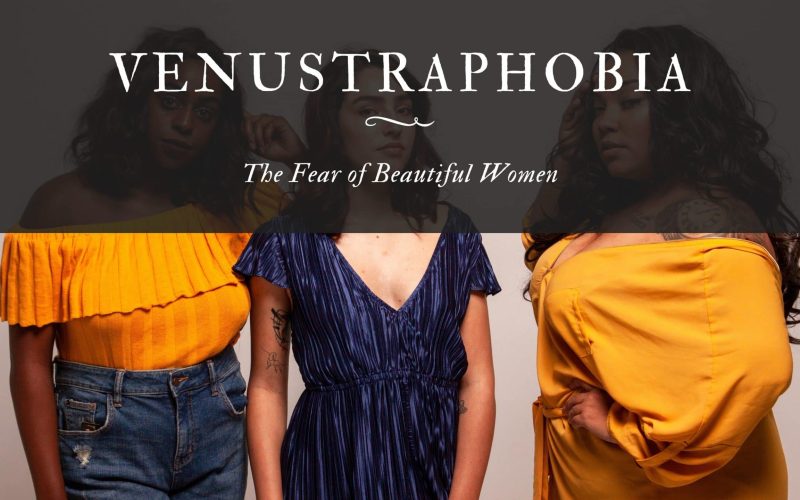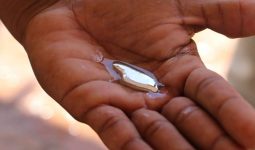We all have something we are afraid of, ranging from fear of inanimate objects, such as fear of shadows, to fear of animals, such as fear of dogs or spiders.
Some people are even afraid of clowns or staying without their phones; such fears are called phobias.
Phobias are recognized by anxiety towards the trigger of such fear, which is quite common.
Now, this may seem quite absurd or somewhat awkward, but have you ever found yourself feeling anxious, intimidated, tongue-tied, or breathless in the presence of a beautiful woman; then you have experienced venustraphobia. The opposite of this phobia is androphobia, the fear of men.
Venustraphobia is the fear of beautiful women and is also referred to as caligynephobia. This fear is characterized by the sheer feeling of anxiety in the presence of a beautiful woman.
Someone with venustraphobia may also have low self-esteem and might, on some occasions, exhibit narcissistic behavior, hatred for women, or depression.
If you are a regular Loud House animated series fan, you will discover that Cylde McBride, Lincoln Loud’s best friend, was venustraphobic. He had a crush on Lori Loud ( Lincoln Loud’s eldest sister).
Clyde would get very nervous, sometimes may have a nosebleed, he would hyperventilate, and on most occasions, he would faint.
As exaggerated and funny as the illustration above seems, those symptoms are quite accurate.
Let’s look at some of the possible causes of this venustraphobia.
Causes
Despite the years of research doctors and scientists have put in, there’s little or no information on where certain phobias originate.
Phobias, of course, are classified under neurosis (Anxiety disorders) in psychology.
- Caligynephobia in some men might be inherited, which means that it could be a sort of genetic disorder. In other words, if one’s father had a negative experience with women, or as a child, this person encountered a very bad scenario with a woman associated with his father, the tendency to be afraid of beautiful women is high.
- In some men, fear of beautiful women could result from negative association (peer pressure). Men normally love to have a circle of friends and share thoughts on certain issues. Because of their association, one could have a friend who had been ridiculed, teased, or jilted by a beautiful woman, and that passively might convince them too to be afraid and dislike beautiful women. And as much as everyone is entitled to their own opinion or beliefs, our friendships with people greatly influence and shape our lives.
- Experiences tend to mold and change our lives in drastic ways. Some of these men with fear of beautiful women might have, in one way or another, had a negative experience involving a beautiful woman, causing physical or emotional harm to them. They might have been rejected, threatened, or jilted by beautiful women.
- The media, in most cases, are not helping matters as they tend to create fear in men about beautiful women. They may unconsciously send subtle messages across to viewers that good looking women have lots of baggage. According to statistics, many beautiful women are single. In a bid to give advice, family relations and close acquaintances tend to exaggerate information on issues involving beautiful women or past experiences, thereby creating this fear in the man.
- Stress is a common factor causing most phobias. As one is more prone to emotional and physical weakness when stressed. Some men who are venustraphobic have the symptoms or experience their peak when stressed.
Symptoms
People who are venustraphobic, just like most phobias, have reactions to this phobia, which impacts their lives and dwindles their confidence and self-esteem.
These symptoms could be either physical or psychological.
Physical symptoms
- Trembling
- Hyperventilation
- Fainting
- Stomach upset and nausea
- Vomiting
- Crying
- Physical distancing
- Heavy sweating, etc.
Emotional symptoms
- Fear of passing out
- Fear of dying
- Fear of self-embarrassment
- Lightheadedness, etc.
It would be of interest to note that people with venustraphobia have every tendency to have Coitophobia ( fear of sexual intercourse) or Klopophobia or Eruetophobia (Fear of genitals) or even worse Gynephobia (Fear of women).
Treatment for Venustraphobia
Most phobias are being treated, and this process starts once the person with the phobia acknowledges that they have that particular phobia.
Treating phobias is usually a long process that requires a lot of courage and determination. Underlisted are ways to lose this phobia.
Self Care
As much as one might require professional help, there are quite several remedies and self-exercises to undergo and try to get free from a phobia.
- Meditation
- Positive confessions
- Positive visioning
- Keeping records and a diary
- Positive pep talks
- Eating healthy
- Exercising
- Rest
- Setting up goals and achieving them.
- Creating a support/backup system
- Building up moral support
Cognitive Behavior Therapy
Cognitive Behavior Therapy is based on the principle of reinforcement. Its main focus is on helping the individual who has the phobia to identify the trigger, desensitizing oneself, and then reinforcing positivity towards that particular fear trigger.
In other words, it deals with helping the individual to get hold of oneself, affirm positivity towards the trigger, and work with the positivity.
This is usually achieved with the help of a counselor and countless counseling sessions. CBT teaches the phobic individual to gain control of oneself.
Desensitization
In layman’s terms, desensitization is the process of getting rid of wrong or obsolete knowledge or information and replacing it with the right or current information and knowledge. In simple terms, it involves the act of unlearning and relearning.
Practicing this is very important for people with phobias as they have to get rid of the wrong notion, which they had earlier on their fear trigger, and replace it with positivity.
This process doesn’t just occur at once; rather, it is gradual. Desensitization works with role-playing as one would need to face the trigger, which is beautiful women.
The individual would need to summon the courage and try getting close to the trigger by giving it a positive outlook.
Once this is completed, the interaction between the now-former trigger would gradually but steadily improve.
Exposure Therapy
Exposure therapy is a set of procedures that involve the confrontation of feared triggers, either in real life or in imagination.
It involves the help of a health counselor, and it is a step-by-step process. The Phobic individual, in this case, is exposed gradually to triggers until the phobia is ridden.
Conclusion
It is never wrong to seek help, though people with certain phobias such as this get ashamed and might find it very difficult to ask for help.
The involvement of family members and friends is very important. There are professionals in this field who are trained to help you find relief. It might take time, but patience and willingness to cooperate with those offering help are key.
As much as the counselor has work to do, the individual has the greater part of the work to do. The individual mostly does the desensitization with little help from their counselor.
Perhaps you are already experiencing symptoms similar to the ones listed above please consult your health care provider who would refer you if necessary to the right physician.
We hope that you found this article helpful. If you feel you have other phobias, do well to peruse through our list of phobias and learn more about how to manage or overcome your fears.
We look forward to reading your comments.





